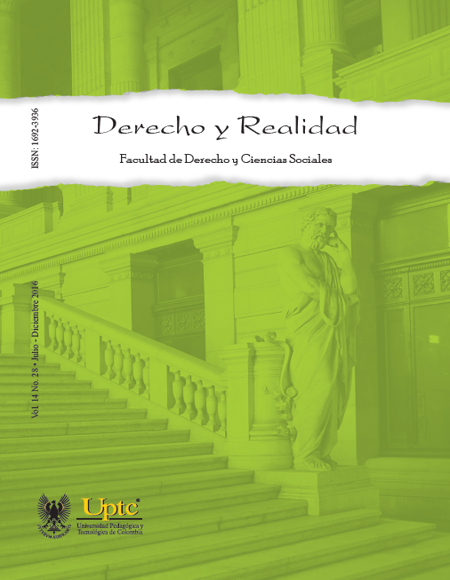The concept of freedom in decisions on freedom of conscience of the Colombian Constitutional Court

Abstract
This paper is a hermeneutical analysis of the concept of freedom in order to understand in what sense the freedom of conscience, which is a positive way of the freedom in philosophical sense, is understood by the provisions of the Colombian Constitutional Court. Thus, the classic definitions of positive and negative liberty are taken into account to determine which of these two meanings is the most prevalent in the judgments of the Court and thereby to establish whether the formulation of Social State of Law set forth in the Constitution, which prioritizes the positive duties of the State, is real and effective. This analysis will be based on some paradigmatic cases in which the freedom of conscience right has been violated.
Keywords
Freedom, freedom of conscience, Constitutional Court, case law, social State of law.
References
Alonso-Fernández, F. (2006). El hombre libre y sus sombras: una antropología de la libertad. Los emancipados y los cautivos. Barcelona: Anthropos.
Arango, J. (1994). La tutela y la seguridad jurídica. En Grandes temas del derecho constitucional colombiano (pp. 181-196). Medellín: Colegio de Abogados de Medellín y Biblioteca Jurídica Dike.
Audi, R. (2004). Diccionario Akal de Filosofía. Madrid: Akal.
Berlin, I. (1996). Cuatro ensayos sobre la libertad. Madrid: Alianza.
Bobbio, N. (1993). Igualdad y libertad. Barcelona: Paidós Ibérica.
Comte-Sponville, A. (2003). Diccionario filosófico. Barcelona: Paidós.
Dworkin, R. (1989). Los derechos en serio. Barcelona: Ariel.
Ferrater, J. (1994). Diccionario de filosofía, tomo I. Barcelona: Ariel.
Gascón, M. (1999). La tesis kantiana acerca de la obediencia al Derecho. En J.
Carvajal (ed.), Moral, derecho y política en Immanuel Kant (pp. 227-240). Cuenca: Ediciones de la Universidad de Castilla-La Mancha.
Hernández, R., Fernández, C. & Baptista, P. (2006). Metodología de la investigación. Iztapalapa: McGraw-Hill.
Higuera, D. (2013). Libertades jurídicas en la doctrina constitucional de Colombia. Tunja: inédito.
Horkheimer, M. (1972). Sobre el concepto de libertad. En M. Horkheimer (ed.), Sociedad en transición. Estudios de filosofía social (pp. 11-20). Barcelona: Planeta DeAgostini.
Kant, I. (1988). Lecciones de ética. Barcelona: Crítica.
Kant, I. (2004). Filosofía de la historia. ¿Qué es la Ilustración? La Plata: Terramar.
Kelsen, H. (1994). Teoría pura del derecho. Buenos Aires: Eudeba.
López, D. E. (2006). El derecho de los jueces (2 ed.). Bogotá: Legis.
Madrid-Malo, M. (1996). Sobre las libertades de conciencia y de religión. Bogotá: Defensoría del Pueblo.
Morineau, M. (2006). Diccionario de derecho romano. México: Oxford University Press.
Niño, V. M. (2011). Metodología de la investigación. Bogotá: Ediciones de la U.
Nussbaum, M. C. (2011). Libertad de conciencia: el ataque a la igualdad de respeto.
Madrid: Katz Editores y Centro de Cultura Contemporánea de Barcelona.
Oxford University Press. (2005). The Oxford Companion to Philosophy (2nd ed.). Oxford, N.Y.: Oxford University Press.
Pino, A. (2006). El concepto de libertad en Isaiah Berlin. Derecho y Humanidades, (12), 172-184.
Ramos, V. M. (s.f.). Libertad y seguridad. La antropología de Thomas Hobbes. Revista Jurídica Jalisciense, (47), 15-39.
Rawls, J. (2006). Teoría de la justicia. México, D. F.: Fondo de Cultura Económica.
Sanguino, J. M. (1994). La acción de tutela. Principios ordenadores. En Grandes temas del derecho constitucional colombiano (pp. 223-244). Medellín: Colegio de Abogados de Medellín y Biblioteca Jurídica Dike.
Vallejo, J. (1994). Visión prospectiva de la Constitución. En Grandes temas del derecho constitucional colombiano (pp. 99-110). Medellín: Colegio de Abogados de Medellín y Biblioteca Jurídica Dike.
Velásquez, C. A. (1994). El intervencionismo de Estado en la iniciativa privada. En Grandes temas del derecho constitucional colombiano (pp. 111-169). Medellín: Colegio de Abogados de Medellín y Biblioteca Jurídica Dike.